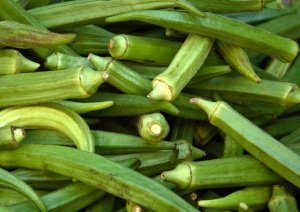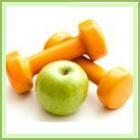Calories in Okra,
Okra Nutrition
How many calories in Okra? See below, the Okra calories for the different serving sizes. We provide you with Okra nutrition facts and the health benefits of Okra to help you to lose weight and eat a healthy diet.
Okra are also known in some countries as lady’s fingers. Okra contain many vitamins and minerals including vitamin A, C, B1-B3, B6, calcium, folate, magnesium, phosphorus, and potassium. They are also a good source of fiber.
Okra are believed to help boost the immune system, and lower cholesterol. Other Okra benefits are thought to include prevention against some forms of cancer, notably colon cancer, and help with constipation.
Below are two calorie tables for raw Okra and cooked Okra. There is also a detailed Okra nutrition table comparing raw Okra versus cooked Okra. When cooking, it's always best to steam rather than boil to retain as many nutrients as possible.
See our vegetable calories comparison chart to compare the Okra calories with the other calories in vegetables to help you build your diet plan. Also, have a look how nutritious Okra is in comparison to the other vegetable nutrition facts.
All of our calorie and nutrition information is provided by the US Department of Agriculture.

Okra, raw
Refuse: 14% (Crown and tips)Scientific Name: Abelmoschus esculentus
Serving Size | Calories per Serving |
| 100 grams | 31 kcal (129 kJ) |
| 1 cup, 100 grams | 31 kcal (129 kJ) |
| 8 pods (3" long), 95 grams | 29 kcal (123 kJ) |
Okra, cooked, boiled, drained
Refuse: 0%Serving Size | Calories per Serving |
| 100 grams | 22 kcal (94 kJ) |
| 0.5 cup slices, 80 grams | 18 kcal (75 kJ) |
| 8 pods (3" long), 85 grams | 19 kcal (80 kJ) |
Okra Nutrition
| Okra nutritional value per 100 g (3.5 oz) Scientific Name: Abelmoschus esculentus |
||
|---|---|---|
| Proximates: | ||
| Okra Nutrients | Okra, raw | Okra, cooked, boiled, drained, without salt |
| Water | 89.58 g | 92.57 g |
| Energy | 138 kJ (33 kcal) | 94 kJ (22 kcal) |
| Protein | 1.93 g | 1.87 g |
| Carbohydrates | 7.45 g | 4.51 g |
| Total Fat: | 0.19 g | 0.21 g |
| Fiber | 3.2 g | 2.5 g |
| Sugars, total | 1.48 g | 2.4 g |
| Minerals: | ||
| Calcium, Ca | 82 mg (8.2%) | 77 mg (7.7%) |
| Iron, Fe | 0.62 mg (3.44%) | 0.28 mg (1.56%) |
| Magnesium, Mg | 57 mg (14%) | 36 mg (9%) |
| Phosphorus, P | 61 mg (6.1%) | 32 mg (3.2%) |
| Potassium, K | 299 mg (6.36%) | 135 mg (2.87%) |
| Sodium, Na | 7 mg (0.29%) | 6 mg (0.25%) |
| Zinc, Zn | 0.58 mg (3.87%) | 0.43 mg (2.87%) |
| Copper, Cu | 0.109 mg (5.45%) | 0.085 mg (4.25%) |
| Manganese, Mn | 0.788 mg (39%) | 0.494 mg (14%) |
| Selenium, Se | 0.7 mcg (1%) | 0.4 mcg (0.57%) |
| Vitamins: | ||
| Vitamin C | 23 mg (38%) | 16.3 mg (27%) |
| Thiamin (Vit. B1) | 0.2 mg (13%) | 0.132 mg (8.8%) |
| Riboflavin (Vit. B2) | 0.06 mg (3.53%) | 0.055 mg (3.24%) |
| Niacin (Vit. B3) | 1 mg (5%) | 0.871 mg (4.36%) |
| Pantothenic acid (B5) | 0.245 mg (2.45%) | 0.213 mg (2.13%) |
| Vitamin B6 | 0.215 mg (10%) | 0.187 mg (9.35%) |
| Folate (Vit. B9) | 60 mcg (15%) | 46 mcg (11%) |
| Vitamin A | 716 iu (14%) | 283 iu (5.66%) |
| Vitamin E | 0.27 mg (2.25%) | 0.27 mg (2.25%) |
| Vitamin K | 31.3 mcg (39%) | 40 mcg (50%) |
| Percentages are relative to US Recommended Daily Intake (RDI) for adults. |
||
Return from Calories in Okra to Lose Weight With Us Home Page
Like This Page?
|
Share This Page:
|
Search Our Site:

Free E-Book:
We Recommend:
Looking to get your body into great shape? Get the very best results for your efforts and money! Save your valuable time from surfing the internet. These are theBestselling Weight Loss Programs

Programs that work and have thousands of satisfied customers worldwide!
